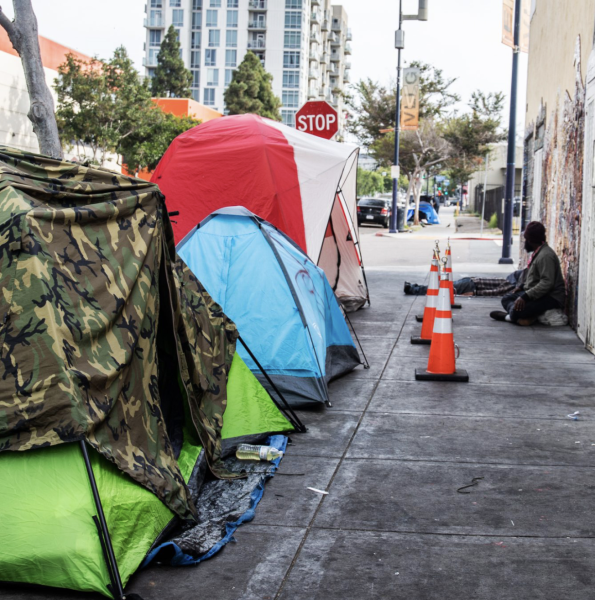President Donald Trump is expected to sign an executive order directing local authorities in Washington, D.C., to increase enforcement against petty crime and remove homeless encampments, the White House announced Feb. 10.
Trump, who labeled the nation’s capital as unsafe and mismanaged during his 2024 presidential campaign, will leverage the federal government’s jurisdiction over the District’s parks and monuments to clear encampments — colloquially known as “tent cities” — and to prosecute crimes with greater severity. While some officials and community members have expressed satisfaction with the policies, others are concerned about the effect they will have on homeless populations in Georgetown and the greater D.C. area.

Christine Wood (SON ’27) is the co-president of Georgetown University’s Homeless Outreach Programs and Education (HOPE), which supports homeless people through advocacy campaigns and service opportunities. Wood said she is worried the crackdown on encampments could jeopardize HOPE programs and harm the individuals with whom they work.
“As co-president of HOPE, I am concerned about the impacts of the executive order on our unhoused community members,” Wood wrote to The Hoya. “The executive order would disrupt established communities and support networks for people experiencing homelessness.”
“Instead, local officials should prioritize expanding affordable housing, strengthening emergency shelter systems to make them safer and more dignified, implementing outreach programs that build trust and help connect people to services, and addressing upstream factors like raising minimum wages and improving access to health care,” Wood added.
On Feb. 19, Trump said governance of D.C. should return to the federal government.
“People are getting killed; people are being hurt,” Trump said. “You have a great police department there. But somehow they’re not utilized properly. We should govern D.C. I think the federal government should take over the governance of D.C. and run it really, really properly.”
According to the annual Point-in-Time (PIT) count, which helps city officials track changes in the number of homeless people, there were 5,616 homeless people in the District in January 2024.
Meanwhile, rates of most crimes within D.C. have decreased significantly in recent years, with violent crime hitting a 30-year low in 2024, but federal and local officials nevertheless see more room for action.
Mayor Muriel Bowser said in a press conference that the federal government is entitled to prosecute adults for crimes committed within the District
“There are parts of the system that the federal government has more control over, or control entirely over, and that’s the prosecution of adults,” Bowser said.
Bowser added that encampments are illegal and homeless residents should access the city’s network of shelters.
“We try to work with our residents to get them to a place where they want to come inside,” Bowser said.
Clearing out encampments, which frequently fluctuate in size and move from place to place, will be a logistical challenge, according to civil rights attorney Joseph Cammarata.
“It would take resources, law enforcement and other personnel to come in and move the people from the encampments,” Cammarata said.
In addition to challenges and expenses, removing encampments may also impair nonprofits and government services as they provide essential services to homeless individuals.
Pria Gadkari (CAS ’27), the service and outreach chair of Georgetown Running Club, coordinates events for organizations that support homeless individuals, such as Miriam’s Kitchen, a local nonprofit that serves food to homeless people. Gadkari said she was surprised by how much help these organizations provide to local homeless individuals.
“We attended the Miriam’s Kitchen orientation two weeks ago and were all incredibly impressed by how thoughtful and well-run the organization was,” Gadkari wrote to The Hoya. “Not only do they serve hundreds of meals a day, but they also provide case management services, hygiene care, clothes and other necessities.”
The executive order, however, may upend the routines and services of programs like Miriam’s Kitchen. Removing large encampments will displace homeless residents from the city center — within walking distance of Miriam’s Kitchen and other services — to locations far across town.
A spokesperson for Miriam’s Kitchen said removing encampments will harm the relationship between service providers and many homeless individuals for whom they work.
“Clearing encampments damages trust and relationships that outreach teams have worked hard to build with residents,” a representative wrote on the nonprofit’s website.
The impending executive order and the displacement it will cause will leave Miriam’s Kitchen scrambling to adapt, especially as details remain uncertain.
Wood said HOPE’s services ultimately stem from a desire to uplift all members of society.
“Service to those in our community who are experiencing poverty and homelessness is not only an act of necessity, but an act of humanity and an act of love,” Wood said.
Wood added that services for homeless individuals are necessary, warning that disbanding the encampments will make it difficult to assist the community.
“If encampments are disbanded, it would become more difficult to connect with and assist community members,” Wood said.